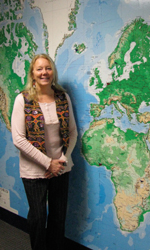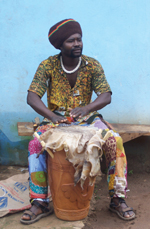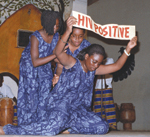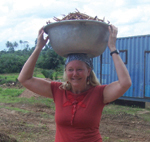|
|
|

|
Out of Africa
Researcher
uses
world
as laboratory
|
by Dawn Brazell
Public Relations
Though Cynthia Cupit Swenson, Ph.D., travels extensively for her
research and comes home to MUSC, a part of her heart always stays in
Ghana.
 MUSC researcher Dr.
Cynthia Cupit Swenson does extensive international work. MUSC researcher Dr.
Cynthia Cupit Swenson does extensive international work.
A heavy sigh escapes as she sits in her office surrounded by stacks of
research papers. She’s mourning the death of Rachael, a talented
dancer from Ghana who died at age 13 because of a lack of medications
and medical care. Ironically, Rachael’s goal was to be a nurse. Boards
being used to build a bookcase for Project Okurase, a nonprofit
organization, were taken to build her coffin instead.
“We’re going to call it Rachael’s Hope,” she said of a medical center
to be built in the village. A fundraiser is being held through the
holidays to raise funds to build a pharmacy and medical center in
Ghana. The mission of Project Okurase (Opportunity, Knowledge,
Understanding, Renewed Health, Arts-Based, Skills
Training and Education) is to address the HIV/AIDS crisis and
poverty conditions in Ghana by helping vulnerable and orphaned
children. The project aims to provide skills training and formal
education to children and women in need, connecting orphaned children
with families, called Way Forward Families, to create the family and
cultural connections these children used to have before the AIDS
epidemic ripped up their villages.
A model of the Education and Arts Centre is in the foyer of the Family
Services Research Center. It’s the brainchild of Samuel Nkrumah Yeboah,
who told her he put out prayers to the universe that the right people
be sent to help his people find a way to better their lives and to
harness their artistic talents.
 Powerful (Samuel
Nkrumah Yeboah) plays his drum. Powerful (Samuel
Nkrumah Yeboah) plays his drum.
Though the drummer, known as Powerful, lived in Ghana, somehow Swenson,
a clinical psychologist and researcher at MUSC got the message.
“I guess we kind of caught that prayer,” she said, laughing. There
couldn’t have been a better person to catch it.
Swenson’s an expert in Multisystemic Therapy (MST), which treats
children by working to strengthen their “villages” of support, whether
that be family, community or neighborhood units. She was doing a
community violence project in Union Heights in North Charleston in the
1990s and became involved in developing a children’s dance company, the
Djole African Dance and Drum Company. They had a need for good quality
drums, which led her to meet Powerful.
Not only did it lead her, but it also led to 40 people, including Eve
Spratt, M.D., of MUSC, going to Ghana so the children could perform
AIDS dances and dramas with Powerful and his performing artists in
2006, despite the $4,000-per-person cost that took two years of
fundraising or that many of the children had never even been to the
airport before. It changed lives, hers and theirs, she said.
One of the girls, who had a troubled childhood, made the trip to Ghana
and was troubled by seeing a baby who couldn’t be intubated properly
and later died. “She made a decision on the spot that she was going to
be a pediatric nurse. She’s a high school senior now, and that’s what
she’s going to do.”
It brought gratitude into their hearts, seeing children play with
sticks and guava fruit wheels as a toy, and still be happy as
could be, she said. “It’s made our kids be citizens of the world. It’s
helped them to be tuned into things that they wouldn’t have been tuned
into.”
Though Swenson’s research now has her in places from England to
Switzerland, she always makes time to make it to Ghana, and she writes
a blog for Project Okurase’s website. “Everything I do in another
culture makes me understand more. Working globally makes me see how
critical a person’s context is to them. If we want to do research for
research’s sake—for publication or for funding—or to deliver medical
care to say ‘I delivered medical care,’ then we don’t need to address
anybody’s context or culture. If we really want to make a change, we
have to. That’s why it’s so important for MUSC to grasp globalization.
It’s not only about going to an international environment. It’s about
what’s going on in our own backyard.”
 The Djole youth
perform an AIDS dance and drama in Accra, Ghana in 2006. The Djole youth
perform an AIDS dance and drama in Accra, Ghana in 2006.
Africa has a huge tradition of extended families and taking care of
other families in distress. The AIDs epidemic has left a trail of more
than 400 orphanages, which puts children in very difficult
environments, she said. The vision of Project Okurase, which was
founded by Powerful but is also her “baby,” is to recreate that village
feel in the center being built and provide a place for vocational
and artistic training.
Though there are no toilets, clean water or electricity, Swenson said
she can’t think of a better way to spend her time. “It’s very
fulfilling. I feel like I’m part of a huge change process in this
world. It feels like you’re part of the family of a community. In the
U.S., it’s about doing huge things and bringing about small changes
sometimes. In Ghana, you can do small things and see huge changes.”
She looks forward to more people at MUSC becoming involved with the
project. There are many ways to volunteer and there’s a nonstop direct
flight now from Atlanta to Accra, the capital city. “I would love to
see people just come and stay in the village and see things you cannot
imagine. It will change their lives. Every tiny, little thing is
appreciated. Everyone is so welcoming.”
 Swenson's travels
require a balancing act, but it's worth it, she said. Swenson's travels
require a balancing act, but it's worth it, she said.
Working in international settings has given her a broader way of
thinking about culture and of family. She has no doubt that it has
enriched her research. She loves getting on Skype and talking to
someone in the village. “We’re a global society because of the
Internet. We’re all one world. We’re really a small world because of
technology.”
Swenson admits all the travel can be tiring, and it’s not always fun
staying somewhere without running water, but she wouldn’t have it any
other way.
“If I’m not doing something research-wise that’s truly making a
difference, then I need to just stop what I’m doing. There really needs
to be a purpose in everything that I’m doing in my professional life or
why am I doing it? My skills and my profession don’t belong to me—they
belong to the people I serve so I better be doing right by them. I’m so
delighted that MUSC is embracing globalization. I think it makes us
richer human beings.”
Want to Help?
For more information on Project Okurase, to find out how to volunteer
or to donate funds, visit http://www.projectokurase.org/
or call Dr. Cynthia Cupit Swenson at 843-876-1800, press 2 and then 22
to leave a message on her e-mail, or Dr. Eve Spratt, 843-876-0504.
Friday, Nov. 26, 2010
|
|
|






